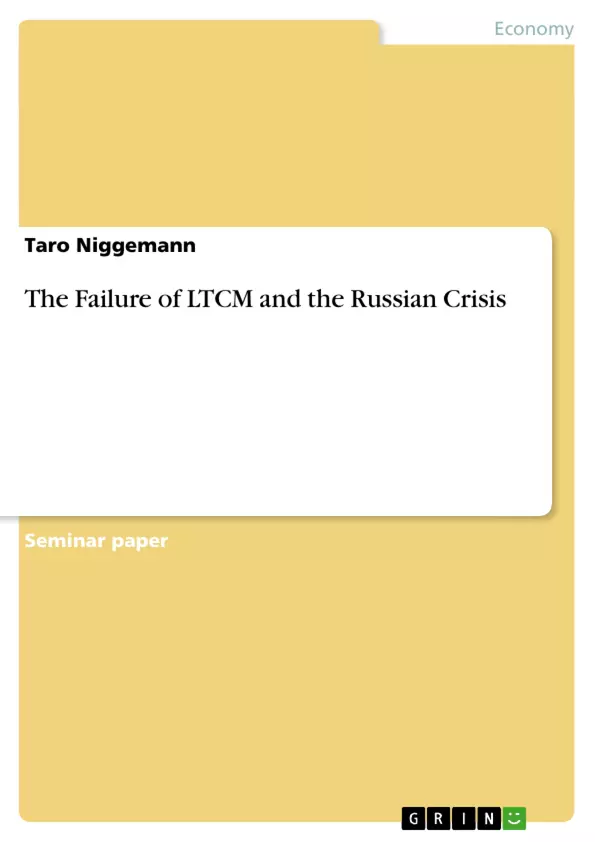The story of the hedge fund Long-Term Capital Management (LTCM) is the story of Icarus, a high-flyer who
became one of the most spectacular failures financial markets have ever seen. The Russian Crisis is often
referred to as the cause of LTCM’s financial downfall. However, the Russian Crisis was merely a trigger and
indirect factor for LTCM’s collapse. The rise to liquidity across global fixed income markets arising from the
Crisis paired with LTCM’s excessive leverage, illiquid investment positions and management mistakes shortly
before and during the Crisis, caused its breakdown which was finally only halted by a bail-out organized by the
US Federal Reserve Bank. This paper analyzes the contributing factors and interrelations between the two events
and concludes with some implications for financial market participants and policy-makers from the two cases
and empirical research on financial crises.
Inhaltsverzeichnis (Table of Contents)
- Introduction
- The Rise and Fall of LTCM
- The Hedge Fund Environment in the Late 1990ies Relative to the Situation Today
- The Founders and the Concept
- Performance Until the Russian Crisis
- The Evolvement of the Russian Crisis
- The Role of the Crisis for LTCM's Performance
- Implications and Conclusions
Zielsetzung und Themenschwerpunkte (Objectives and Key Themes)
This paper aims to provide a detailed analysis of the collapse of Long-Term Capital Management (LTCM), a prominent hedge fund in the 1990s. It explores the role of the Russian financial crisis in triggering LTCM's downfall, while also highlighting the fund's internal factors, including excessive leverage and management decisions. The paper aims to shed light on the interrelationship between macroeconomic events and hedge fund failures, providing insights for financial market participants and policymakers.
- The rise and fall of LTCM, a hedge fund utilizing quantitative strategies and significant leverage.
- The impact of the Russian financial crisis on global markets and its specific influence on LTCM's performance.
- The role of leverage, risk management, and investment strategies in hedge fund failures.
- The relationship between macroeconomic events and hedge fund performance, including lessons for financial market participants and policy makers.
Zusammenfassung der Kapitel (Chapter Summaries)
The first chapter introduces the study by examining the history of LTCM, its reliance on sophisticated mathematical models, and its spectacular collapse in 1998. It highlights the role of the Russian financial crisis as a trigger for LTCM's downfall. The chapter outlines the paper's structure, which delves into the hedge fund environment, the origins and investment strategies of LTCM, the Russian crisis, and its implications for financial markets.
Chapter two focuses on LTCM itself, examining its rise and fall within the broader context of the hedge fund industry in the late 1990s. It analyzes the fund's investment strategy, which relied heavily on arbitrage and leverage. The chapter explores the fund's initial success, driven by its skilled team and favorable market conditions, and its eventual struggles in the face of increasing competition and volatility.
Chapter three examines the unfolding of the Russian financial crisis of 1998. It discusses the factors leading to the crisis, including the Russian government's economic policies, the role of international investors, and the subsequent financial contagion that spread across global markets.
Chapter four delves into the connection between the Russian crisis and LTCM's failure. It explores how the crisis exacerbated LTCM's vulnerabilities, leading to significant losses and a near-collapse of the fund.
Chapter five delves into the broader implications of the Russian crisis and LTCM's collapse, drawing connections to existing research on financial crises. It discusses the role of leverage, risk management, and systemic risk in financial instability.
Schlüsselwörter (Keywords)
This paper examines the interplay of key themes including hedge funds, quantitative investment strategies, leverage, risk management, financial crises, the Russian financial crisis of 1998, and the collapse of Long-Term Capital Management (LTCM).
- Quote paper
- Taro Niggemann (Author), 2009, The Failure of LTCM and the Russian Crisis, Munich, GRIN Verlag, https://www.grin.com/document/139160




